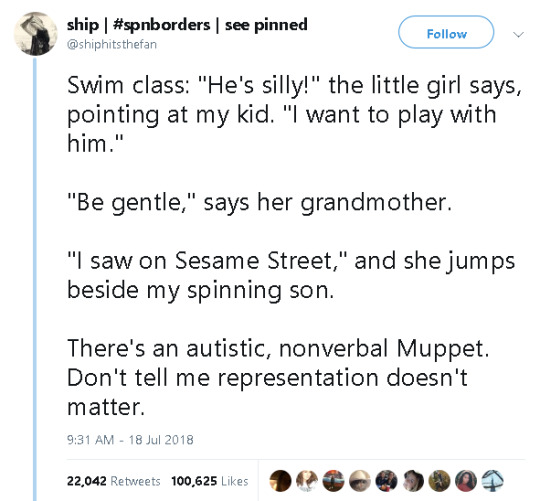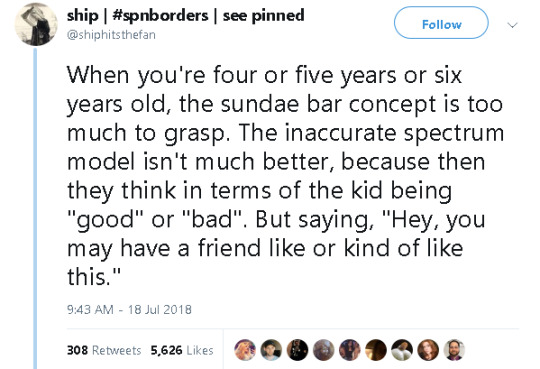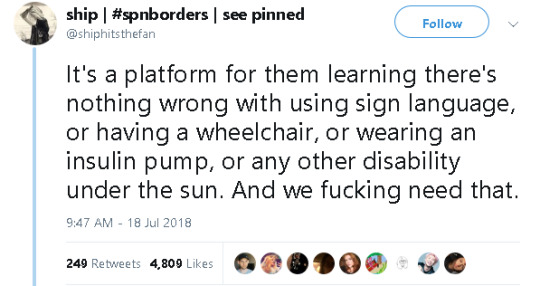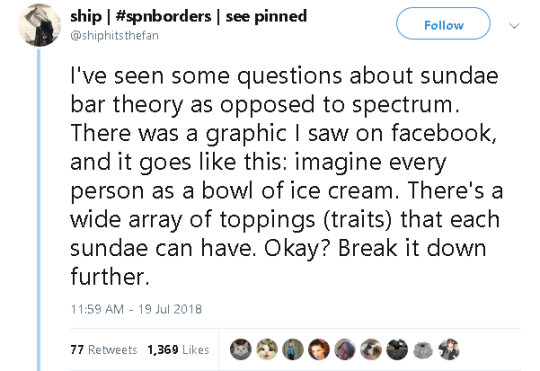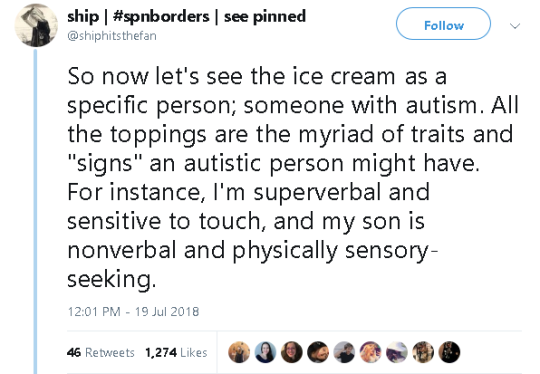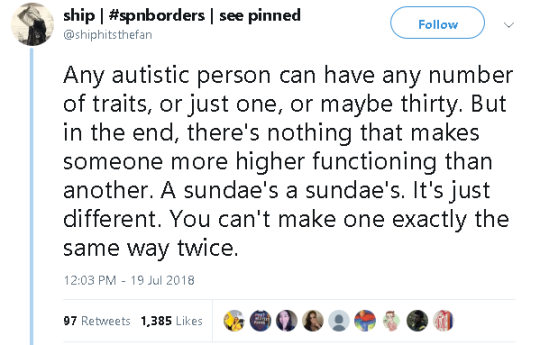Text
Which is more efficient?
You reached a good point in your activities to get up for a moment.
You must complete two tasks; refill the water at your desk, and go to the bathroom.
Which is more efficient?
A) Refill cup and return to desk. Go to bathroom and return to desk. Finished
B) Refill cup and use bathroom in one trip to avoid going back to the desk.
The answer:
Option number A is more efficient!
Why?
Because I will always no matter how much I try to remember, forget my glass of water in the kitchen unless it’s the only thing I’m doing.
268 notes
·
View notes
Text
Even positive and affirming comments can be distracting and disruptive when unsolicited.
As a result, my brain refuses to give any indication to people in my physical location of the good things I spend energy and time focusing on while I’m doing them. I haven’t been home alone for months now that everyone else is always home too. I just want a space to be fully asocial sometimes.
#actuallyautistic#the pandemic#It is super hard for me to speak aloud unless directly prompted by someone else#and it gets even harder when there's anyone in my sound space who might hear me making unprompted sounds#and so since my mom's work is ann online for the time being#her work space happens to be just on the other side of the door to my room#I've found a really good online service to learn a language I've wanted to study#but i can't do the speaking sections unless everyone is asleep#but i also have a harder time speaking the more tired I am too#so i need to wake up and have breakfast when they're all going to sleep in order to have the time and freedom to do it#it's really annoying#still though#glad that's the bulk of my worries
88 notes
·
View notes
Text
Opportunity
You know how the media is full of people complaining that they’ve lost their sense of time, don’t know what to do with themselves, can’t concentrate or “be productive?”
They’re learning what it feels like to have ADHD and/or executive dysfunction!
We need to capitalize on this. We need to refer to it when explaining ourselves to people.
“Yeah, so remember how you lost your sense of time while quarantined? That’s what it’s like for us all the time.” And so on.
5/4/20
626 notes
·
View notes
Text
Normalize saying “I don’t know enough to have an opinion.”
67K notes
·
View notes
Text
I grew up drawing during lectures in school, so now when I want to draw I need to listen to at least vaguely informative audio of people talking. Anything else and my mind will distract me from drawing. When I'm not drawing or doing another similarly hand focused nonlinguistic activity however, I'm unable to stay focused on a podcast.
It's definitely a situation where I need both for optimal brain stimulation.
I have ADHD so I’m immune to podcast
147K notes
·
View notes
Text
Me as an autistic child: Stacking objects, lining objects up
Me as an autistic adult: Carefully ordering lists of songs and other things according to preference
1K notes
·
View notes
Text
Autistic Tip #5
Executive dysfunction can make it feel impossible to be productive, even when you need to be. Especially during the pandemic, when we’re stuck at home without our usual routine, this is a big issue. Here’s some things that help me work through my executive dysfunction:
Note: These tips might not work for you! If you don’t feel comfortable doing some of these things, don’t feel pressured to! I have memory issues along with my autism so I need a highly structured life to be productive. You may not need as much structure as me!
Write down events and to dos.
Having everything you need to do written down takes a lot of burden off you mind and helps you feel less stressed. It also helps with memory issues if you have them.
Checking tasks and events off of lists and calendars help with a passive sense of accomplishment, which can make it easier to be productive.
Always looks at the amount of things you did throughout the day. You do much more than you think you do!
Suggested methods:
1) Write events down on a calendar.
Write everything you need to do on a calendar. Meetings, classes, family events, work, etc. You want to have this information in multiple places. For example, I use my phone’s calendar, which is synced to my laptop’s calendar. I also have a sticker on my wall that’s a weekly calendar, so I can focus on the things I need to do for the week!
Check off events as they pass and look at all the functions you attended! Be proud of yourself for not missing things!
2) Have a daily and weekly to do list.
These are lists of things you have to do every day and every week. This will mostly consist of chores, self care, pet care, and meals. It’s your choice what is a daily thing and what is a weekly thing. Put absolutely everything down, no matter how small!
It’s a good idea to hang these lists somewhere you can easily see them. As you do the tasks on the lists, you can check them off (I use sticky notes so I don’t ruin the list, since mine is paper.) You can use a whiteboard for this if you want!
As you check things off, you’ll notice just how much you actually get done and how fast you do it! That alone can make it easier to keep doing tasks so you can see that list filled up with checks! You can even reward yourself once your daily to do is done!
3) Make another daily to do list.
Alright, this one is different from #2. This list is a list of electives to do in a day.
I use this mostly for my college assignments. I pick 3-5 assignments (usually small ones) to do that day, but are not due that day. (I try to stay ahead so I can keep my lists as electives, since close due dates can make executive function worse.) Make sure to make this list the day that you’ll be doing the tasks. Planning in advance can make it harder to actually do them. You want to catch your own brain off guard here!
Again, as you complete things, check them off! The point of this list is to feel super good! You’re doing things ahead of time! Look at how productive that is!
Alternate between work and fun
Moving between something fun and something not so fun can help you get things done without getting bored or side tracked!
Doing something you enjoy right after doing work is rewarding!
Suggested methods:
1) Listen to/Watch a video while you work.
This is best for when you’re doing tasks that don’t require too much thinking, like chores or cooking. You can watch a YouTube video, watch TV, listen to a podcast, or something else while you do the things you need to get done.
This makes it 100x easier for me to do chores! Yeah, I might be folding laundry, which is long and boring, but I’m also watching an episode of my favorite show! Or a video on my current special interest! As far as my brain is concerned, I’m relaxing, not working.
2) Work, Relax, Repeat.
For things that require more thought, you can use this method. Pick an item on your to do list and do it. Or, if it’s too long for you to bring yourself to do, do a part of it. Need to type a paper but you can’t even get out of bed? Just move to your desk or grab your laptop and move on to the next step.
Now, pick something you enjoy doing, but be conscious of what it is. Don’t pick something you can easily get stuck on, like reading or social media. Pick something that has clear start and end points, like one battle in pokemon, or one episode of a show.
Then, go and do another task. After that, do something else you enjoy. And repeat again and again until you’re done for the day! This switching can get time consuming, but it’s so much better than not being able to do anything at all!
Know when to take a break
Take as many breaks during the day as you need to! Take an entire day off to relax if you feel you need it! Don’t burn yourself out by trying to brute force through everything. In the long run, this will make it harder for you to be productive.
Be mindful of health conditions
This section may seem counter productive, but these tips are meant to help long term.
If you have a condition that makes you feel unwell or causes you pain, addressing that condition will make it easier to be productive.
Suggestions:
1) If you feel unwell, lower your work load
Regardless of how busy you are, if you feel sick, don’t push yourself! Listen to your body. If it’s telling you you’re done for the day, you’re done. It’s not the end of the world if you miss something for your health. And don’t feel guilty about it either. Your well being is more important than a chore or assignment.
2) If you’re physically incapable of something, don’t try to do it
I’ll use myself as an example for this one. I have double-jointed wrists that get strained easily, so I can’t type a lot despite being a college student. So, I can only spend so much time on assignments in a day.
The first week of quarantine, I worked on my laptop twice as much as usual (among other things) and I got an overuse injury. I couldn’t even use my phone, much less my laptop for four (4) days. That was a lot of missed time.
TLDR: you might think you’re being more productive short term by pushing your limits, but in a few days there’ll be consequences. Please don’t hurt yourself.
Anyone with executive dysfunction can reblog!
#this is the first recommended post tumblr showed me after I finished writing my post just now lol#it feels very fitting
2K notes
·
View notes
Text
Autism, Dyslexia, and Adding Expression Changes to a Visual Novel
(I want to start by acknowledging that I’ve been inactive for years at this point. I lost the energy to do everything I wanted to for a long time while I was working retail. I have more free time now, and have actually done a lot with my time over the past half year.)
I’m writing this to help myself process the factors that are hindering my progress with something I want to do, and hopefully some of my thoughts can help anyone with similar roadblocks.
Over the past 6 months I’ve been working entirely by myself on a Visual Novel as a way to fill my time while staying unemployed in an isolated environment. For the most part I’ve enjoyed the challenge of managing a diversity of tasks that all feed into the one big project, writing, coding, drawing, planning, character designing, managing a complex branching structure of player choices. It’s all been something I enjoy doing enough that even the hard tasks are something I can still initiate.
However, I finally got to the task of drawing alternate expressions for the characters and inserting them into the dialogue in appropriate places. This task has been destroying my resolve to do at least a little work on the game 5+ days a week. Since beginning this 9 days ago, I did one day of art, two days of adding them into the dialogue (but ended earlier in the day than usual), another half day of art, and that’s it.
These past two days I have tried and failed to initiate the task of actually reading my dialogue, and adding in the appropriate facial expression for the entirety of a character’s dialogue. I also failed to do it today too, but I hope that in writing this, I can resolve some of what’s stopping me from it.
The most significant factor is, I believe because, I’m dyslexic and reading is tiring. I read best when I can lose track of the experience of reading, and instead get absorbed into the projected mental/sensory experience of the content of what I’m reading. This task runs entirely in contrast to that state. For this I need to stop every several lines to assess if I need to have the character change expression and if so, to which of my drawn expressions.
Another relevant factor is simply that this is a task of assessing what facial expressions and body language would fit a character. I need to use a lot of mental energy to assess not just what I should expect the character to do, but also then imagine how other people might understand the change in facial expression. This all being mental processes I need to actively invoke each time.
I also have the limitation that I have a set of defined images I drew for this, and there’s not always one that fits the expression I think I need. So in some cases I take the time to make a new variant of the closest one. In other cases, nothing seems close at all, and I might not even know what I actually want. At that point it turns into a game of trying out each existing expression and settling on the one that seems the least discordant with the dialogue.
My default state of being has my affect flat and I’m not the least bit bothered by that. So writing these characters for many months, and seeing them each with one static sprite to represent them all this time never seemed unnatural to me. It feels like now I’m trying to give them life in a way that I don’t myself express. This really is a valuable thing for me to do. While I tried to make the expression ane meaning in the writing as unambiguous as possible, having another tool to show what my character are expression is great for reinforcing and supporting those meanings. It’s just so much harder to implement than I expected.
One bright side to all of this is that I’m absolutely sure this would be so much harder if my characters had human faces. Instead they’re all basically cats, which gives me the feeling of more leeway with getting the expressions ‘right’ or close enough.
In writing this, I don’t feel like I thought of any new strategy to make it easier, but hopefully I’ve increased my motivation to put up with how tiring it is so I can just get this all done and move on to more fun tasks in this project. I’m also open to hearing any ideas anyone else has to make it an easier task for me to do.
50 notes
·
View notes
Note
Hey! What are some of the things you do/have because of your autism, if you dont mind? I want to learn a but more about it and thought itd be best to ask from the source. Thank you! ♡♥♡♥♡
I often stand with crossed legs
I still have the ‘to be or not to be’ thing from Hamlet memorized that I memorized for extra credit 5 years ago
my duolingo streak is 746 days long
I interpret things I hear as literal even if I also hear them as intended at the same time
My room is a mess and I know where everything in it is
I can tell you way too much about eurovision considering I’m american
I like to draw and sculpt cats even though I don’t actually like cats more than a little. (an old special interest)
Learning ASL is much easier than my efforts learning other languages because speaking is hard
There’s more and I don’t know if this is what you were looking for, but because autism impacts everything of who I am in one way or another, it’s easy to connect anything about me to autism.
304 notes
·
View notes
Text
Autistic people are not being rude for prioritising their own needs over what could be an overloading social situation
3K notes
·
View notes
Text
That autistic feel when your feet are cold but having socks on under the covers is sensory hell!
625 notes
·
View notes
Text
I grew up hearing the phrase “you never stick with anything, what’s the point” a lot. I’ve always been attracted towards seemingly disconnected interests, and gone through phases of being really into something. But eventually my interest would fade and I would move onto something else.
Or at least that’s always how it’s been phrased for me, by others. Now I realize that my interest for the old thing didn’t fade so much as my interest for something new outshined it, and that’s vastly different.
I was always made to feel bad about it, with every abandoned endeavour I was told I needed to stop starting things if I wasn’t going to stick with them. I was told I was wasting time and money picking up these random interests and abandoning them after a year.
So eventually, I stopped picking things up. I told myself “what’s the point, I’m going to give up in a year anyway”. Even worse, I started dismissing every new interest, because I had no way of knowing if my interest was “real” enough or just another passing phase. I stopped trying new things, I stopped looking up stuff that piqued my curiosity, and having chronic depression made it really easy to leave everything on the dirty floor of neglected ideas. The more they piled up, the more depressing it was. All these things that could be nice, but I just can’t take care of them.
I realize now how bullshit that kind of thinking is. So what if I stopped doing karate after a year? That’s one more year of karate than most people I know. And in that year I learned discipline, I learned to listen to a teacher, something I had never done before in all my years of private education. I learned the true meaning of respect, that it’s something you do out of faith at first and maintain as it’s reciprocated, not something you do blindly and regardless of how you’re treated.
It gave me the foundation for the determination and grounding I needed to practice yoga. Another year. Not enough to be good at it maybe, but again a year more than most people I know and a year that is not lost, but gained. I learned balance, I learned to listen to my body, I learned how to let go of emotional tightness through physical stretching.
And then iaido, only a few weeks because I couldn’t afford to keep going. The year of yoga I had done a couple years previous had given me a better starting point than the other newcomers to the class. I already had balance, I had strength in my legs and I had better posture. In those months I learned the importance of precision, the true definition of efficacy, the zen state that is incessant repetition.
Did I practice long enough to get good at iaido, and yoga, and karate? No. Of course not. It takes years to become proficient and decades to master any of those things, but I learned other skills and those skills were an invaluable part of my growth both spiritually and emotionally. Likewise for my forays into painting, sewing, graphic design, film. I’m a photography student now heading into my second year of school, and every single second of practice I have in those other disciplines has given me more experience in those areas and made learning easier.
Skills carry over. They intersect and connect in ways that are sometimes unexpected. Nothing is ever lost, experience is never a waste of time or worthless or stupid. Allow your focus to wander, reflect on what you learn, and consider how you can keep using it in other aspects of your life. Stop telling people their interests aren’t worth their time.
75K notes
·
View notes
Text
Do you ever cycle through the same 4 apps on your phone over and over again and feel like a tiger pacing its cage at the zoo
381K notes
·
View notes
Text
my policy for “they’re just doing it for attention” has always been and always will be “then someone needs to pay attention to them”
285K notes
·
View notes
Photo
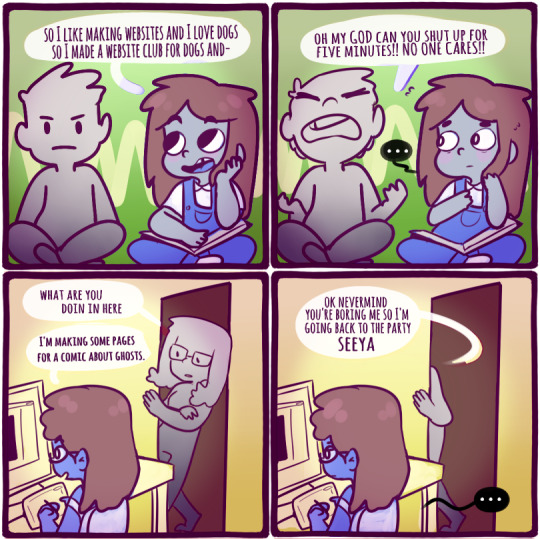

if you’ve been trained to to dislike yourself for enjoying anything due to years of being told you’re annoying clap your hands 👏👏👏
if I listed out every particular instance that was met with negativity enough for me to stop feeling comfortable talking about it, this comic would be like 50 panels.
[ more comics | Patreon | Tapastic ]
146K notes
·
View notes
Text
I know someone who's at the opposite extreme of this, and is very aware of specific things their body needs nutritionally, byond just the vagueness of what a craving for a specific food can do. It's impressive and I'm jealous.
Advice like “listen to your body” sounds great. Like, it sounds like the best approach to living life.
But my body only has two settings: BAD and fine
So, it’s like…
My body: BAD FEEL BAD IT’S BAD
Me: What’s bad? Am I hungry? Thirsty? Should I be wearing my glasses? Is my tummy upset? Am I hormonal? Is my anxiety acting up? Am I sick?
My body: BAAAAAAAAAAD
Me: Okay, I guess it’s time to grab a snack, a bottle of water, my glasses, some rennies, and remember to restock my vitamins. And then hope one of those things works…
1K notes
·
View notes
